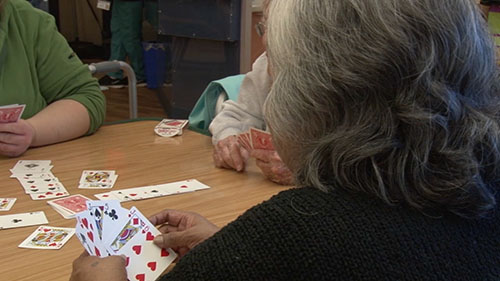Cronkite News has moved to a new home at cronkitenews.azpbs.org. Use this site to search archives from 2011 to May 2015. You can search the new site for current stories.
Silver Alert supporters hoping for a green light from lawmakers
PHOENIX – When Mary Black, an 86-year-old woman with dementia, drove away from her St. David home with no money, water or food, a system similar to the Amber Alerts for abducted children may have alerted officials to her whereabouts, Cochise County Sheriff Mark J. Dannels says.
Once was when a motorist called 911 to report Black’s vehicle swerving on the Interstate 10. Another was when a hunter found her car abandoned near Arizona City.
Two weeks after her disappearance in November, Black was found dead from exposure a mile from her car.
“We couldn’t get the process going on beyond law enforcement channels in the search, and that’s not right,” Dannels said. “The system literally wouldn’t connect.”
Working with Sen. Gail Griffin, R-Hereford, Dannels is seeking a law establishing a Silver Alert system that would help find missing Arizonans ages 65 and older.
SB 1097 received unanimous approval from the Senate on Feb. 3 and is awaiting action by the House.
Griffiin said Black’s death called attention to the need for emergency alerts to help seniors in danger.
“Nobody bothered at the local police to call the Sheriff’s Office because these regulations weren’t in place,” she said.
Under Arizona’s Amber Alert plan, law enforcement agencies and broadcasters partner to inform the public when a child is abducted. The alerts interrupt programming using the Emergency Alert System. In 2008, the Arizona Attorney General’s Office rolled out a plan to issue alerts for missing adults with mental or physical disabilities.
Griffin’s bill would require the Arizona Department of Public Safety to establish a Silver Alert Notification System to quickly share information on missing seniors.
For an alert to be issued, law enforcement would have to conclude that the senior disappeared under suspicious circumstances, that he or she is danger and that all local resources have been used.
Dannels said the bill would leverage a system that already works to save lives.
“People think law enforcement always communicates well,” he said. “That’s not always the case. The Amber Alert gets law enforcement all over the state to come together and get on the same page.
“The longer they are out there, the more dangerous it gets for them,” he added.
The Amber Alert system recovers 90 percent of missing children within 72 hours, according to the most recent U.S. Department of Justice Amber Alert Report.
Steve Jennings, associate state director of advocacy for AARP Arizona, said his organization supports the concept of Silver Alerts, especially for those diagnosed with mental illness or who have been deemed by courts to be incapable of managing their own affairs. However, he said states should tread carefully to guard against exploitation of seniors.
“Age itself can become a vulnerability,” Jennings said. ”For instance, you have a rich uncle and you’re the heir. Might not triggering a Silver Alert make people think they’re incompetent? A missing person is a missing person, but it doesn’t have to be an incompetent person.”
At least 21 states have alert systems specifically for missing senior citizens, according to the Alzheimer’s Foundation of America. Dannels said Arizona has a compelling reason to follow suit.
“Just think, these people that go missing are someone’s loved one, someone’s mother, brother, father, sister,” he said. “Why can’t we just put all eyes on them and work to solve the problem?”









